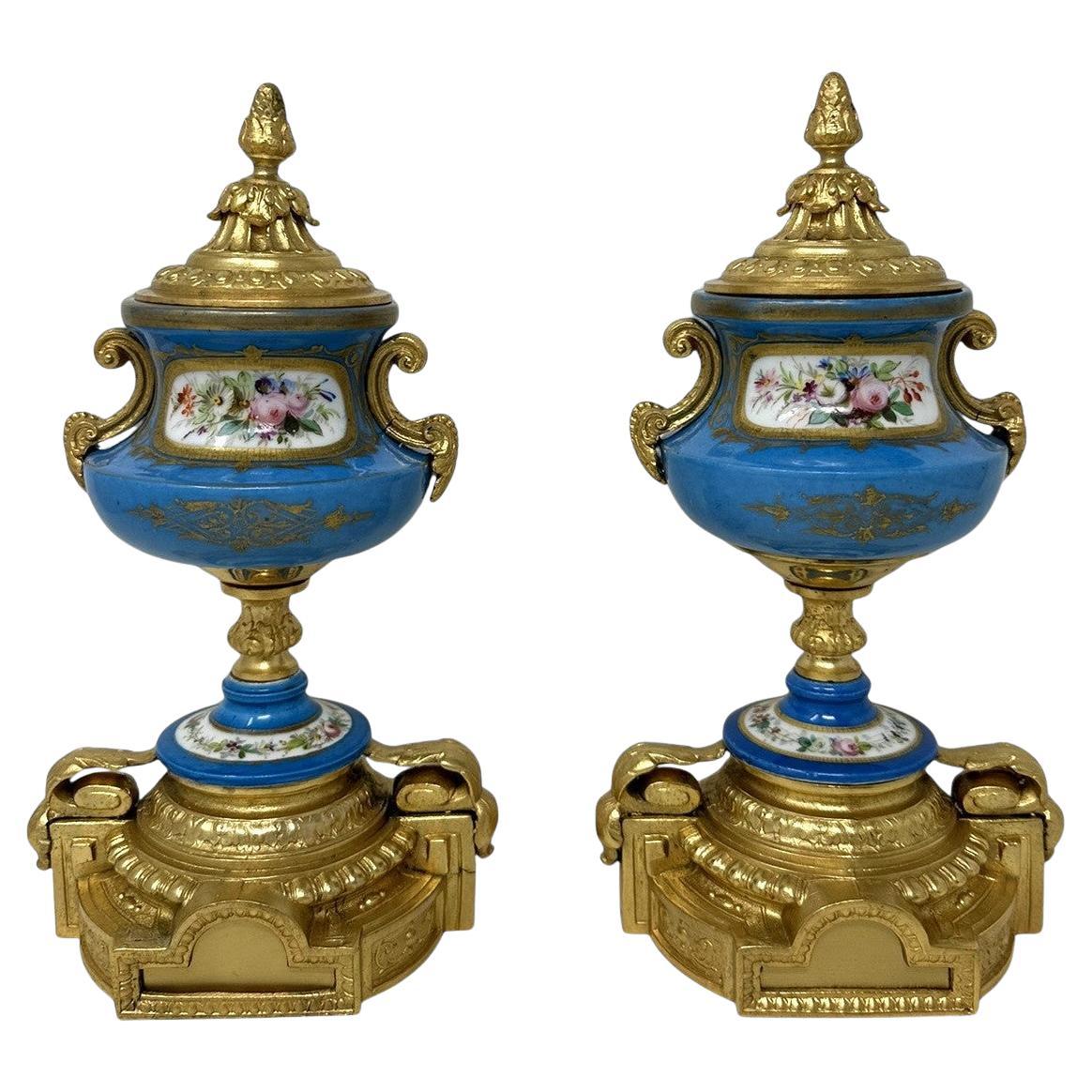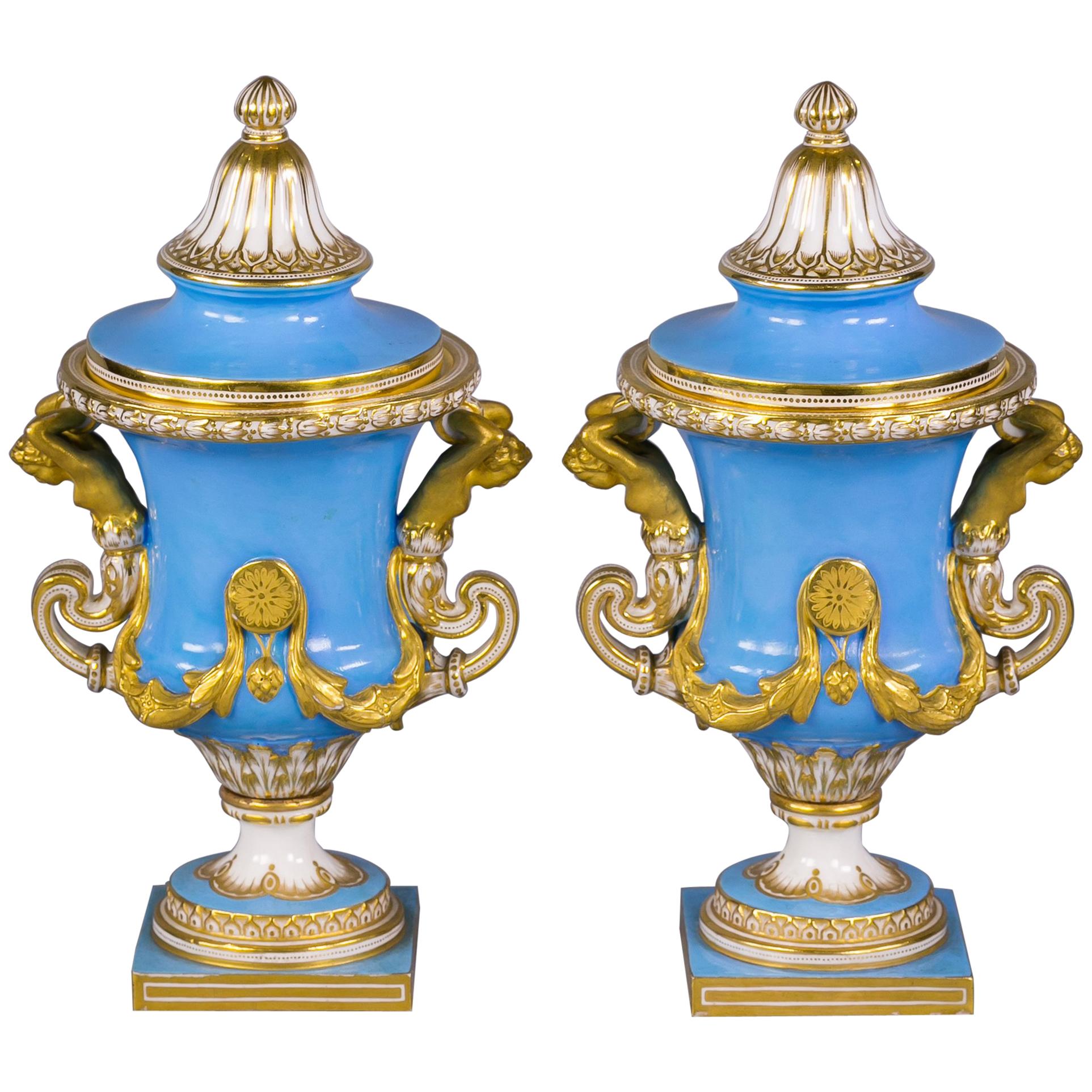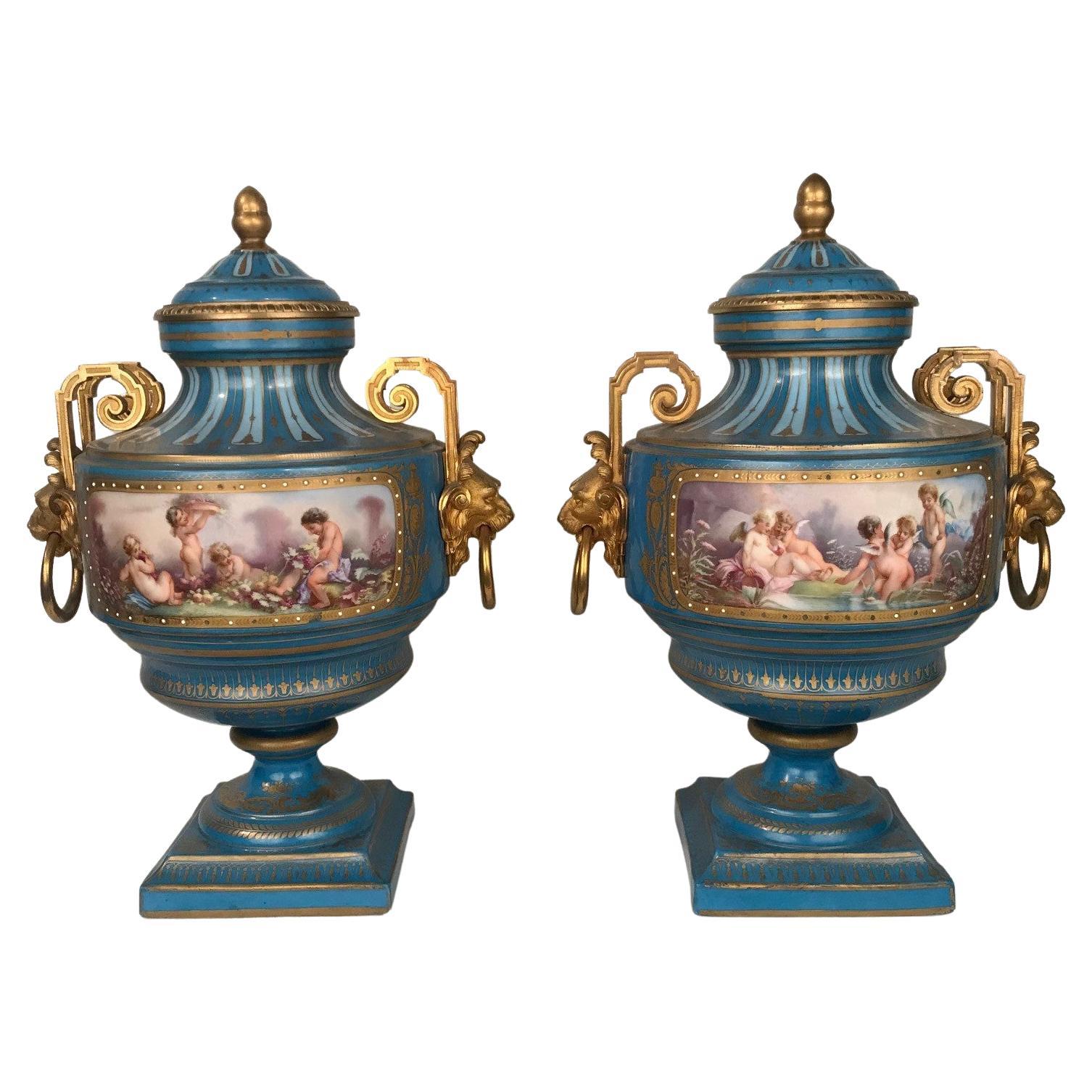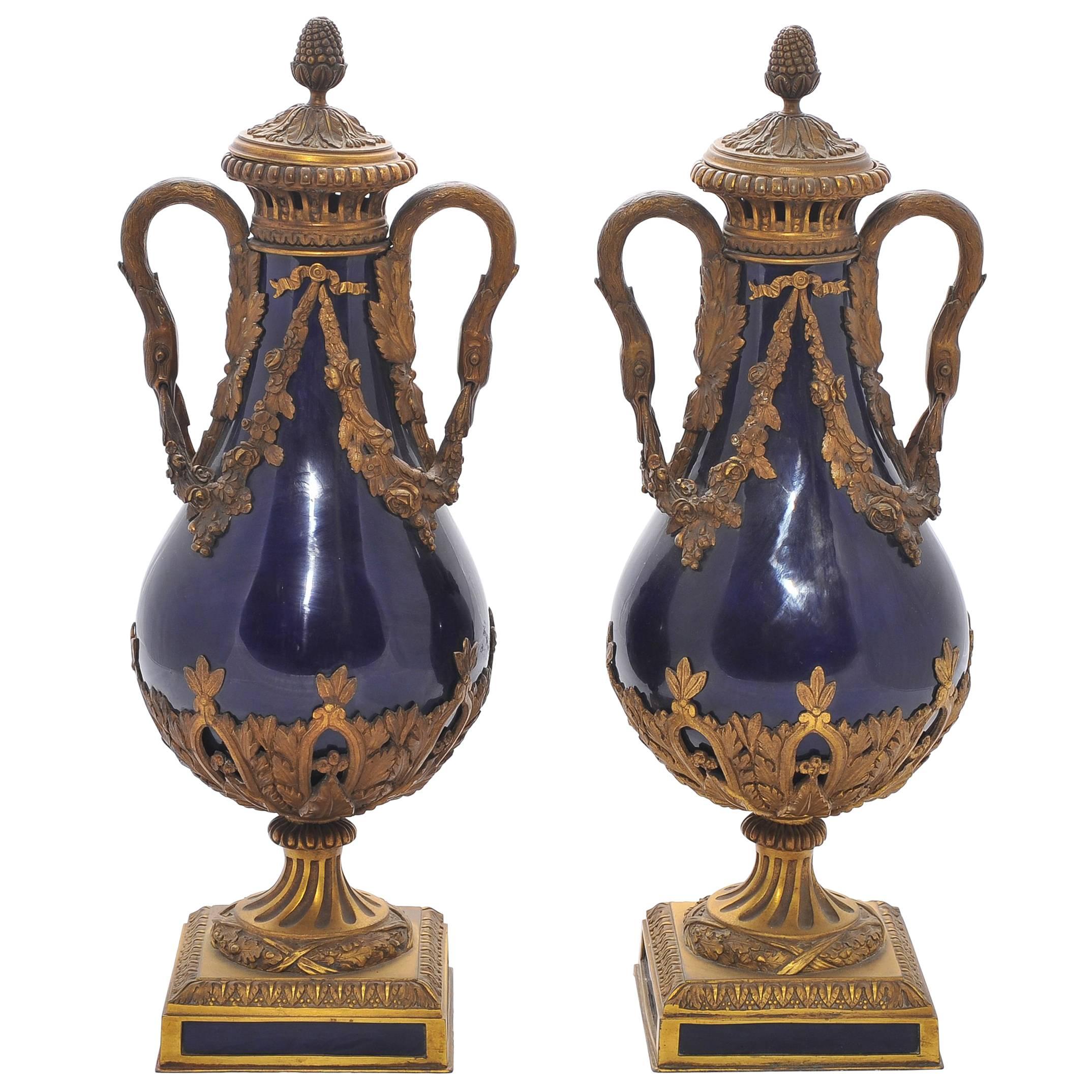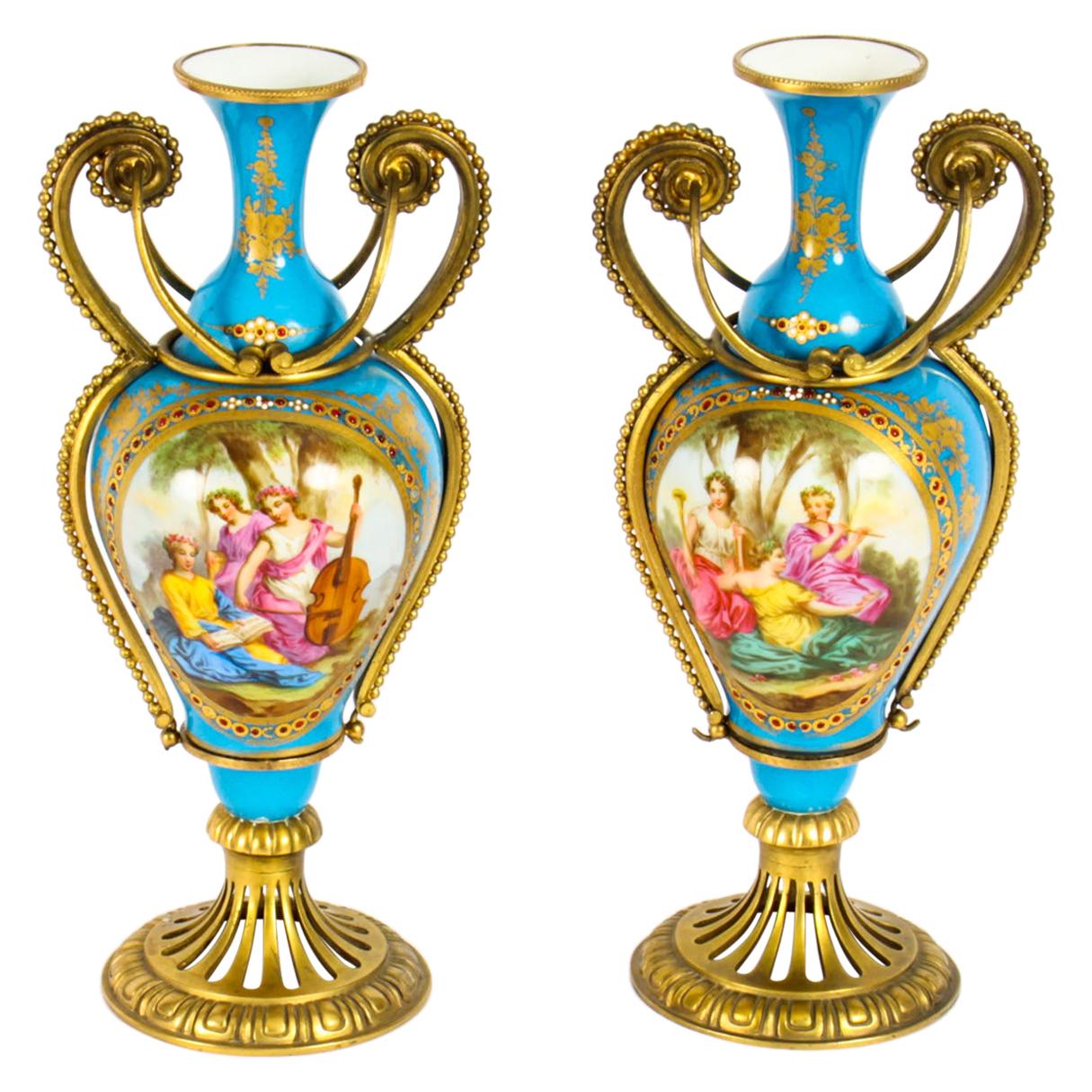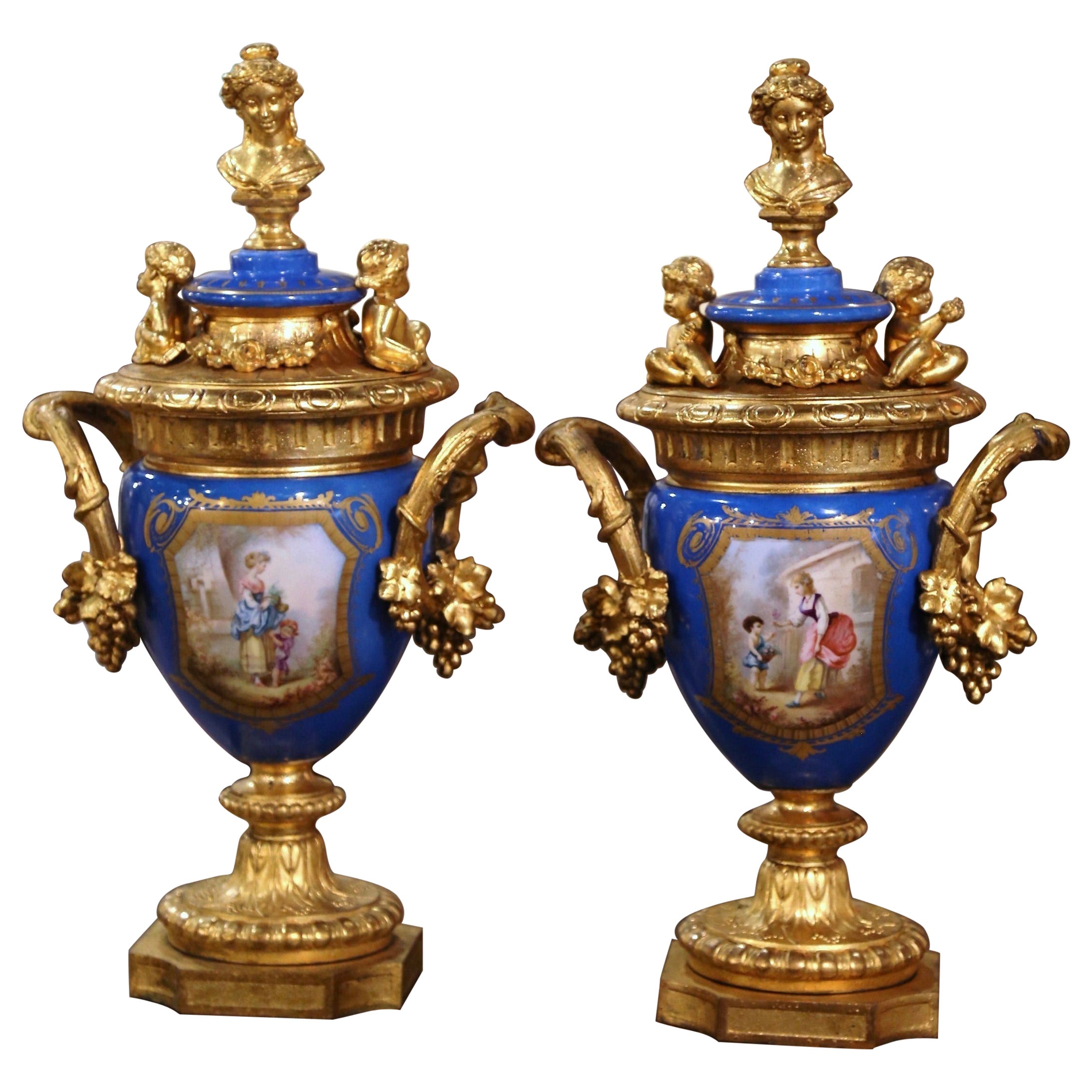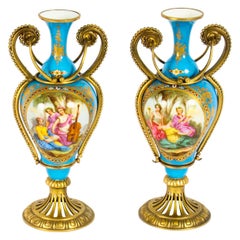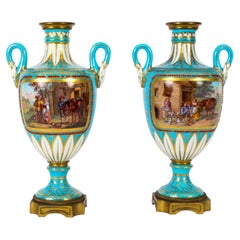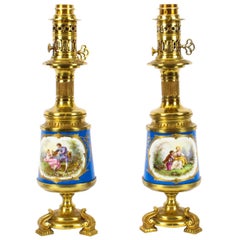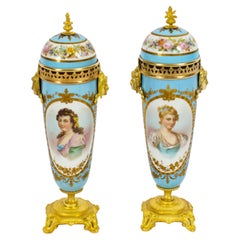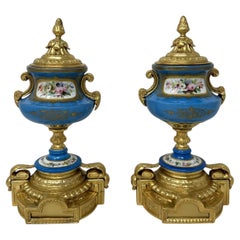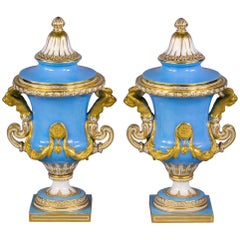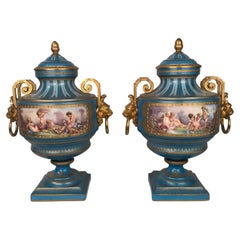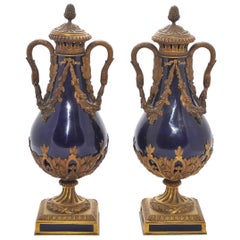Items Similar to Antique Pair French Bleu Celeste Sevres Urns 19th C
Video Loading
Want more images or videos?
Request additional images or videos from the seller
1 of 22
Antique Pair French Bleu Celeste Sevres Urns 19th C
$1,804.48per set
£1,325per set
€1,552.56per set
CA$2,532.88per set
A$2,770.68per set
CHF 1,443.56per set
MX$33,337.56per set
NOK 18,280.80per set
SEK 17,163.92per set
DKK 11,593.81per set
About the Item
This is a beautiful antique pair of French Sevres style porcelain and ormolu mounted twin handled urns, in the Louis XV manner, Circa 1870 in date.
The bleu celeste grounds are superbly decorated with panels of bird in flight on one side with colourful flowers on the other, within lion scroll handles.
They are raised on circular foliate gilt plinth bases standing on elegant toupie feet. They are complete with carved giltwood shaped pedestals.
They are delightful objects which will look fabulous in any surrounding.
Condition:
The urns in excellent condition, please see photos for confirmation.
The Giltwood pedestals have wear to the original fabric.
Dimensions in cm:
Height 33 x Width 15 x Depth 11 - With pedestals
Height 29 - Without Pedestals
Dimensions in inches:
Height 1 foot, 1 inch x Width 6 inches x Depth 4 inches - With pedestals
Height 11 inches - Without Pedestals
Sevres Porcelain traces its roots in France to early craftsmen who had small manufacturing operations in such places as Lille, Rouen. St. Cloud, and most notably Chantilly. It is from Chantilly that a cadre of workers migrated to the Chateau de Vincennes near Paris to form a larger porcelain manufactory in 1738.
French King Louis XV, perhaps inspired by his rumoured relationship with mistress Madame de Pompadour, took an intense interest in porcelain and moved the operation in 1756 to even larger quarters in the Paris suburb of Sevres. Sevres was also conveniently near the home of Madame de Pompadour and the King's own Palace at Versailles.
From the outset the king's clear aim was to produce Sevres Porcelain that surpassed the established Saxony works of Meissen and Dresden. Though the French lacked an ample supply of kaolin, a required ingredient for hard-paste porcelain (pate dure), their soft-paste porcelain (pate tendre) was fired at a lower temperature and was thus compatible with a wider variety of colours and glazes that in many cases were also richer and more vivid. Unglazed white Sevres Porcelain "biscuit" figurines were also a great success. However, soft-paste Sevres Porcelain was more easily broken. Therefore, early pieces of Sevres Porcelain that remain intact have become rare indeed.
The Sevres Porcelain manufactory always seemed to be in dire financial straits despite the incredibly fine works it produced. In fact, the king's insistence that only the finest items be created may have contributed to the difficulties. Only a limited number of European nobility could afford the extravagant prices demanded for such works. King Louis XV and eventually his heir, the ill-fated Louis XVI, were obliged to invest heavily in the enterprise. Ultimately, the Sevres Porcelain Factory produced items under the name of "Royal" and thus the well-known Sevres mark was born. King Louis XV even mandated laws that severely restricted other porcelain production in France so as to retain a near monopoly for his Sevres Porcelain. The king even willingly became chief salesman for the finest of his products, hosting an annual New Year's Day showing for French nobility in his private quarters at Versailles. He eagerly circulated among potential buyers, pitching the merits of ownership and policing the occasional light-fingered guest.
Sevres Porcelain may have indeed given the makers of Meissen and Dresden a run for their money by the end of the 18th Century but for the French Revolution. By 1800, the Sevres Porcelain Works were practically out of business due to the economic devastation of the new French Republic.
About the time when Napoleon Bonaparte named himself Emperor of France (1804), a new director was named for the Sevres Porcelain Manufactory. Alexandre Brongniart, highly educated in many fields, resurrected Sevres Porcelain. Soft-paste porcelain was eliminated altogether thanks to the earlier discovery of kaolin near Limoges. For four decades until his death, Brongniart presided over monumental progress for Sevres Porcelain, catering not only to Napoleon himself, but at last to include the more financially profitable mid-priced market in the emerging middle class.
Our reference: A2911.
About the Seller
5.0
Platinum Seller
Premium sellers with a 4.7+ rating and 24-hour response times
Established in 1983
1stDibs seller since 2012
1,408 sales on 1stDibs
Typical response time: <1 hour
Associations
LAPADA - The Association of Arts & Antiques Dealers
- ShippingRetrieving quote...Shipping from: London, United Kingdom
- Return Policy
Authenticity Guarantee
In the unlikely event there’s an issue with an item’s authenticity, contact us within 1 year for a full refund. DetailsMoney-Back Guarantee
If your item is not as described, is damaged in transit, or does not arrive, contact us within 7 days for a full refund. Details24-Hour Cancellation
You have a 24-hour grace period in which to reconsider your purchase, with no questions asked.Vetted Professional Sellers
Our world-class sellers must adhere to strict standards for service and quality, maintaining the integrity of our listings.Price-Match Guarantee
If you find that a seller listed the same item for a lower price elsewhere, we’ll match it.Trusted Global Delivery
Our best-in-class carrier network provides specialized shipping options worldwide, including custom delivery.More From This Seller
View AllAntique Pair of French Ormolu Mounted Bleu Celeste Sèvres Vases, 19th Century
Located in London, GB
This is a beautiful antique pair of French Louis Revival Sèvres "Bleu Celeste" porcelain and ormolu mounted twin handled vases, circa 1880 in date.
They are superbly decorated in ...
Category
Antique 1880s French Vases
Materials
Ormolu
Antique Pair of French Bleu Celeste Porcelain Urns 19th Century
Located in London, GB
This is a fine and rare antique pair of French porcelain ormolu mounted twin handled urns in the Sevres manner, dating from Circa 1860.
The decorative twin handle vases are super...
Category
Antique 1860s French Porcelain
Materials
Ormolu
Antique Pair of French Bleu Celeste Sèvres Vases Lamps, 19th Century
Located in London, GB
This is an exquisite large pair of French Sèvres Porcelain and ormolu mounted oil burning table lamps that have been skillfully converted to electricity ...
Category
Antique 1870s French Porcelain
Materials
Ormolu
Antique Pair French Duck Egg Bleu Sevres Urns 19th C
Located in London, GB
This is a beautiful antique pair of French Sevres porcelain twin masque head handled lidded urns with dome lids, in the Louis XV manner, Circa 1870 in date.
The vases with a duck...
Category
Antique 1870s French Urns
Materials
Porcelain
Antique Pair Coalport Vases Cobalt Blue by A Perry 19th C
Located in London, GB
A superb pair of Coalport twin handled vases, late 19th century in date.
The painted shaped panels feature handpainted landscapes with birds set within shaped cartouches by A Perry,...
Category
Antique Late 19th Century Vases
Materials
Other
Antique Pair French Grand Tour Gilt Bronze Classical Urns 19th Century
Located in London, GB
This is a remarkable pair of antique French Grand Tour ormolu and Carrara marble urns, circa 1860 in date.
These stunning urns have been superbly cast in the same form as the ancie...
Category
Antique 19th Century French Grand Tour Urns
Materials
Carrara Marble, Bronze, Ormolu
You May Also Like
Antique Pair Celeste Blue French Sèvres Porcelain Ormolu Urns Vases Centerpiece
By Manufacture Nationale de Sèvres
Located in Dublin, Ireland
Stunning Pair of French Sevres Soft Paste Enameled Porcelain and Ormolu Twin Handle Table or Mantle Urns of traditional urn form and of outstanding quality, and medium size proportio...
Category
Antique 19th Century French Late Victorian Urns
Materials
Ormolu
Pair of French Porcelain Gilt and Sky Blue Covered Urns, Sevres, circa 1860
Located in New York, NY
With adorned caryated figures as handles.
Category
Antique 1860s French Vases
Materials
Porcelain
Antique Pair of French "Sevres" Bleu Celeste and Gilt Bronze Covered Urns
Located in Montreal, QC
These are large, French and of excellent quality. From acorn finials to square stepped bases, this pair exude quality unmistakably. They have the de luxe look of items from the Belle...
Category
Antique 1880s French Louis XVI Urns
Materials
Bronze
Pair of 19th Century Sèvres Blue, Ormolu Vases
By Manufacture Nationale de Sèvres
Located in Brighton, Sussex
A good quality pair of 19th century Sèvres Royal blue porcelain vases, each with classical gilded ormolu lids, handles and bases.
Category
Antique 19th Century French Ceramics
Materials
Ormolu
$10,894 / set
Pair of 19th Century French Blue Porcelain and Gilt Bronze Sèvres Urns Vases
By Manufacture Nationale de Sèvres
Located in Dallas, TX
Decorate a mantel or a console with this important pair of porcelain and bronze Sèvres urns. Created in Paris, France, circa 1870, each impressive vase sits on a square bronze base w...
Category
Antique Mid-19th Century French Urns
Materials
Bronze
Pair of 19 th c. French urns in the Sevres style with champleve accents
Located in Houston, TX
The champleve work on these pieces is exquisite and very well done.
The hand painted scenes are exceptional and painted in very sof
Pastel hues. The ormolu mounts are well cast and t...
Category
Antique Late 19th Century French Urns
Materials
Porcelain
More Ways To Browse
Soft Paste
White Sevres
Sevres Marks
Antique Police
End Of The Day Vase
Antique Soft Paste
Soft Paste Antique Porcelain
Antique Ormolu Vase
Madame De Pompadour
Pair Of French Porcelain Birds
Bleu Celeste
White Porcelain Figurine
Antique Sevres Porcelain Vase
Sevres Biscuit
Sevres Porcelain Pair Urns
Vase Bleu
Urn Vases
Antique White Porcelain Figurines
